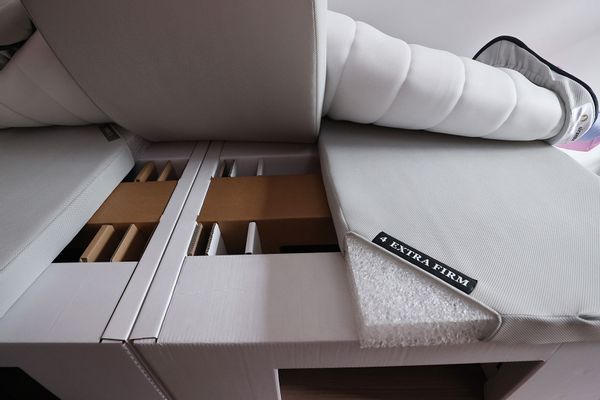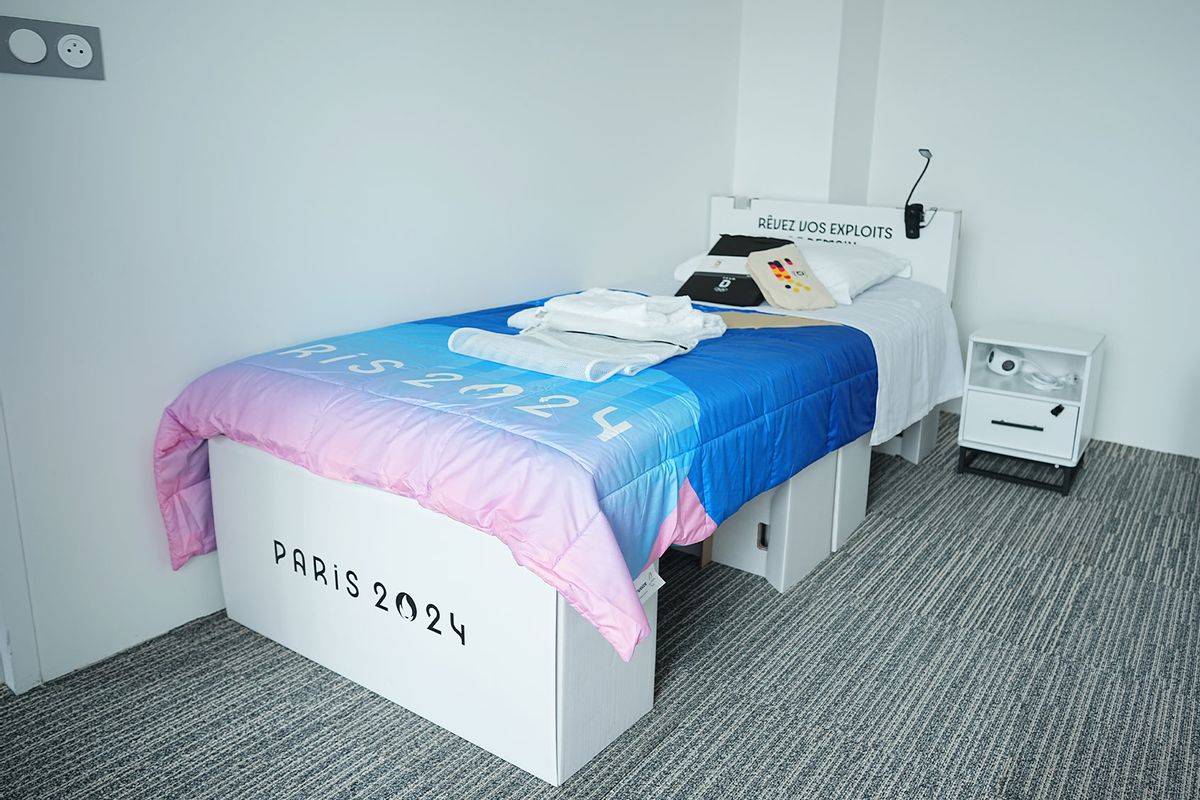On your mark, get set . . . celibacy?
The countdown to the 2024 Summer Olympic Games is officially on, with the opening ceremony in Paris taking place on Friday, June 26. As such, social media has been awash with all sorts of related news — including how the "anti-sex" cardboard beds from the 2020 Games have made a reappearance, with a number of athletes quite literally weighing in on the viral sleep setup.
First introduced in the summer of 2021 in Tokyo, Japan, the seemingly flimsy beds, constructed from disposable cardboard, were labeled as "anti-sex" in a reported effort to decrease the risk of COVID-19 transmission. "Beds to be installed in Tokyo Olympic Village will be made of cardboard, this is aimed at avoiding intimacy among athletes," wrote Team USA Olympic runner Paul Chelimo on X/Twitter at the time. "Beds will be able to withstand the weight of a single person to avoid situations beyond sports."
In a follow-up tweet, Chelimo quipped, "At this point I will have to start practicing how to sleep on the floor; cause If my bed collapses and I have no training on sleeping on the floor I’m done. More added stress heading into Tokyo!"
Olympic officials at the time swiftly dispelled the rumor of the bed's flimsiness after Irish gymnast Rhys McClenaghan shared a video of himself jumping on the bed to test its sturdiness. "Thanks for debunking the myth," the officials tweeted. "You heard it first from @TeamIreland gymnast @McClenaghanRhys – the sustainable cardboard beds are sturdy!"
Today, many have a different perception of COVID's contagiousness, leading some athletes to question the resurgence of the cardboard beds for the Paris Games.
Olympic officials clarified in a recent TikTok why the beds are still useful: they're sustainable. While they're the same style as used for the Tokyo Olympics, they're "100% made in France" and consist of three "modules” meant to allow athletes to adjust the firmness and length based on their size. Officials also noted that the beds would be recycled in France after the Games.
 A recyclable cardboard bed frame is seen in a room in the Paris 2024 Olympic and Paralympic Village during a press tour in Saint Denis, near Paris, France, June 4, 2024. (Gao Jing/Xinhua via Getty Images)On July 20, McClenaghan took to social media once again to share a video of himself leaping and somersaulting on his bed, captioning the post, "Paris Oympics 'Anti-sex' beds debunked (again)."
A recyclable cardboard bed frame is seen in a room in the Paris 2024 Olympic and Paralympic Village during a press tour in Saint Denis, near Paris, France, June 4, 2024. (Gao Jing/Xinhua via Getty Images)On July 20, McClenaghan took to social media once again to share a video of himself leaping and somersaulting on his bed, captioning the post, "Paris Oympics 'Anti-sex' beds debunked (again)."
After performing a series of moves in which he exerted his full body weight on the mattress in a "rigorous" fashion, McClenaghan claimed, "They passed the test. It's fake — fake news!"
British springboard diver Tom Daley shared footage of himself on Instagram showing the beds to his followers, explaining the nooks and crannies of the cardboard contraption — embossed with the phrase “Rêvez vos exploits de demain," meaning “Dream about your achievements of tomorrow” — and equipped with a mattress, mattress topper "and our own little Paris '24" comforter.
"And as you can see, they're pretty sturdy," Daley said while jumping around on the bed.
Rather than serve as sexy-time inhibitors, it would seem that the aim of the beds is to simply be recyclable and more environmentally friendly, as noted by TODAY.
Still, the sustainability underpinning the beds hasn't stopped some athletes from vocalizing certain comfort-related qualms. Aleah Finnegan, a Filipino-American gymnast representing the Phillippines, shared in a TikTok that her bed was "not very soft."
"They're not that comfortable," she concluded.
In a separate TikTok, Australian water polo player Tilly Kearns stated that the mattress was "rock hard."
A spokesperson from Airweave, the company that makes the mattresses, told TODAY, "Airweave differs from traditional mattresses by containing no springs or foam — we’ve collaborated with sleep experts and athletes to optimize the performance-enhancing benefits of sleeping on an airweave mattress.
"We encourage all athletes to join us at the Mattress Fitting Center in Athletes Village for a personalized consultation, which uses our AI-based MattressFit app to analyze and recommend the best configuration for their body type/needs. We’ve had the pleasure of positively connecting with hundreds of athletes in Paris already and aim to meet hundreds more.
"Not only are Airweave mattresses unique because they’re fully customizable," the spokesperson continued, "the science-backed interwoven design also ensures a firmer sleeping surface that maintains ideal sleeping posture, effortless turning, better distribution of weight, and optimal breathability for longer periods of quality sleep."
Read more
about this topic
- "It was so, so brave": Simone Biles' doc director on the gymnast pulling out of the Tokyo Olympics
- "Breakdancing is an American art form": From its origins in the 1980s to New York to the Paris Olympics
- "These athletes should be more famous": "Sprint" shows how an "alpha personality" creates winners



Shares